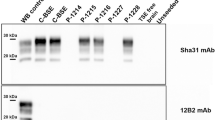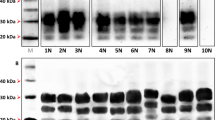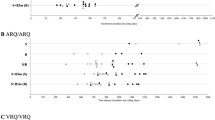Abstract
SCRAPIE has been transmitted to the cynomolgus, or crab-eating, monkey (Macaca fascicularis) with an incubation period of more than 5 yr from the time of intracerebral inoculation of scrapie-infected mouse brain. The animal developed a chronic central nervous system degeneration, with ataxia, tremor and myoclonus with associated severe scrapie-like pathology of intensive astroglial hypertrophy and proliferation, neuronal vacuolation and status spongiosus of grey matter. The strain of scrapie virus used was the eighth passage in Swiss mice (NIH) of a Compton strain of scrapie obtained as ninth intracerebral passage of the agent in goat brain, from Dr R. L. Chandler (ARC, Compton, Berkshire).
This is a preview of subscription content, access via your institution
Access options
Subscribe to this journal
Receive 51 print issues and online access
$199.00 per year
only $3.90 per issue
Buy this article
- Purchase on Springer Link
- Instant access to full article PDF
Prices may be subject to local taxes which are calculated during checkout
Similar content being viewed by others
Author information
Authors and Affiliations
Rights and permissions
About this article
Cite this article
GIBBS, C., GAJDUSEK, D. Transmission of Scrapie to the Cynomolgus Monkey (Macaca fascicularis). Nature 236, 73–74 (1972). https://doi.org/10.1038/236073a0
Received:
Issue Date:
DOI: https://doi.org/10.1038/236073a0
This article is cited by
-
Prion disease modelled in Drosophila
Cell and Tissue Research (2023)
-
Non-human primates in prion diseases
Cell and Tissue Research (2023)
-
Transgenic mouse models expressing human and macaque prion protein exhibit similar prion susceptibility on a strain-dependent manner
Scientific Reports (2019)
-
Transmission of scrapie prions to primate after an extended silent incubation period
Scientific Reports (2015)
-
Sheep major histocompatibility (OLA) complex: linkage between a scrapie susceptibility/resistance locus and the OLA complex in Ile-de-France sheep progenies
Immunogenetics (1988)
Comments
By submitting a comment you agree to abide by our Terms and Community Guidelines. If you find something abusive or that does not comply with our terms or guidelines please flag it as inappropriate.



